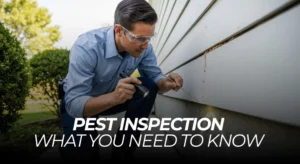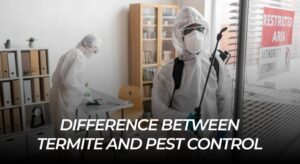The wet season provides heat relief to people while giving pests favorable environmental conditions to multiply. Any untreated pest problem begins with straightforward intrusions from ants in the kitchen and escalates to rodent shelter-seeking behavior. The good news? Planning will help protect your house from pests before the rainy season begins.
How to Pest-Proof Your Home Before the Rainy Season Starts
This article explains how to pest-proof your home before the rainy season hits. Follow our recommendations to prevent unwanted intruders from entering your home.

Understand Why Pests Thrive in Rainy Seasons
The combination of heavy rainstorms drives pests such as rodents, ants, and cockroaches to abandon their usual habitats because of rising water levels. These pests scour homes for shelter and nourishment by secreting themselves in damp corners, basements, and attics.
The damp climate from rainy months matches the ideal habitat conditions for mosquitoes and termites to survive and multiply. The combination of standing water acting as a breeding space and damp wood attracting termites threatens vital structural elements in your house. Identifying why pests exhibit heightened activity in rainy conditions helps prevent their intrusion.
Seal Cracks and Gaps in Walls and Foundations
Pests can easily access homes through tiny holes located in walls, window frames, and doors. Ants and other insects’ entrance through small spaces creates the potential for unwelcome intrusions. To detect vulnerabilities, you should thoroughly check the entire home structure, beginning with its foundation.
Sealants, caulk, and weather-stripping materials should be used to protect against pests at these entry points. Targets for pest entry exist near utility points such as electrical and water pipes, which frequently create gaps through which pests can enter your home. Sealing off these entry points will prevent pests from accessing your home.
Keep Doors and Windows Secure
Insects and rodents enter residential buildings through the access points of doors and windows. During rainy periods, they can freely enter through damaged screens and unprotected windows and doors.
Check that all your doors and windows close properly whenever possible. Your rainproof defenses begin with doorframe installation of proper weather-stripping and fixes for broken window screens or complete replacements when required. Put door sweeps in place to seal off small holes near the bottom of your doors. The small expense needed can successfully prevent pests from entering your home during rainy seasons.
Remove Food and Water Sources
During rainy periods, your home develops various water sources that begin as indoor leaks and end as standing puddles throughout your property. Rodents and cockroaches can enter your kitchen by combining open food scraps and wet weather conditions.
Put your food in airtight containers because you must clean up food crumbs and spills from surfaces after each use. Address leaky plumbing immediately, followed by a quick assessment to eliminate damp conditions from sinks and tubs. Outdoor pest control requires removing all standing water, which helps mosquito control. Homeowners can effectively minimize pest entry by actively monitoring food and water sources.
Manage Your Outdoor Spaces
Outdoor spaces attract pests unless homeowners maintain them correctly. Dense vegetation with collected leaves and blocked drainage system openings is an excellent hiding place and a productive pest breeding site.
Regular mowing, bush trimming, and proper waste disposal work are needed to eliminate spaces where pests might live. Regular gutter and drain cleaning prevents water accumulation, which mosquitoes find irresistible. Keeping potted water-capturing plants at a distance from entrance areas makes pests less likely to approach your home.
Inspect and Clean Your Home Regularly
When your home remains clean and organized, the likelihood of pest infestation decreases. Perform scheduled inspections in combination with thorough deep cleans that minimize hidden areas for pests to hide. Concentrate cleaning efforts on under-the-sink cabinets, basements, and attics because these are places where pests like to hide.
A regular vacuuming schedule for carpets, furniture, and corners will help eliminate potential pest eggs and nests. This practice benefits your home by eliminating small food particles that might attract pests. Regular cleaning lets you detect potential pest problems before they spread into uncontrollable infestations.
Use Natural Pest Repellents
Homeowners with children or pets should opt for natural pest repellents because they provide the safest solution against pests in the house. Many pests, such as cockroaches and spiders, stay away from homes treated with essential oil sprays made from peppermint, lemon, or eucalyptus.
Natural oils should be applied to openings where pests enter or diluted in water for spraying areas that serve as pest gathering spots. Natural repellents, including vinegar solutions and diatomaceous earth, work effectively to keep ants and minor insects away from your home. The introduced methods combine environmental friendliness with a decreased need for dangerous chemicals.
Consider Professional Pest Control Services
Homeowners in high-risk areas who experience constant pest infestations during rainy seasons should seek professional pest control assistance. Prior investment in these services protects your home from future damage while maintaining its safety and cleanliness.
Professional pest protection services offered by pest control companies protect homes from pests during critical storm periods. Early investments in pest prevention services help protect your home from damage while maintaining hygiene in your living space.
Keep an Eye on Potential Re-Infestation Areas
Implementing safety protocols leaves some pest species with the potential to reenter your home during rainy months. Regular inspections must focus on drainage holes, basements, and attics since these areas are where pests tend to reappear.
You should maintain a watch list of vulnerable locations that have had past pest infestations. Frequent inspections of high-risk areas must be conducted, and emerging problems should be addressed immediately. Active property monitoring will ensure your home stays free of pests throughout the season.
How Pest-Proofing Benefits You Beyond the Rainy Season
The benefits of pest-proofing aren’t limited to the rainy season; when your house is free from pests, it stays cleaner and more habitable throughout the entire year. The home maintenance techniques presented in this document positively affect both housing cleanliness and operational efficiency.
Taking measures against pests will prevent long-term structural damage from termites and rodent-related problems. By maintaining these practices, you protect your house as a secure refuge and content sanctuary. It is recommended to hire professional Termite Treatment expert if its already too late.
Conclusion
Neutralize pest presence in your environment through early preparation and consistent pest-related activities until the rainy season arrives. The proactive approach starts early by applying these diverse strategies while keeping up their maintenance throughout the season. Every protective measure you implement, from sealing weak spots, helps create a safer living environment within your home.
Need more advice on keeping your home pest-free? Contact Big Apple pest control team to receive individualized solutions from specialists who will help you monitor and control pests effectively. Your home becomes a haven thanks to our combined efforts.







